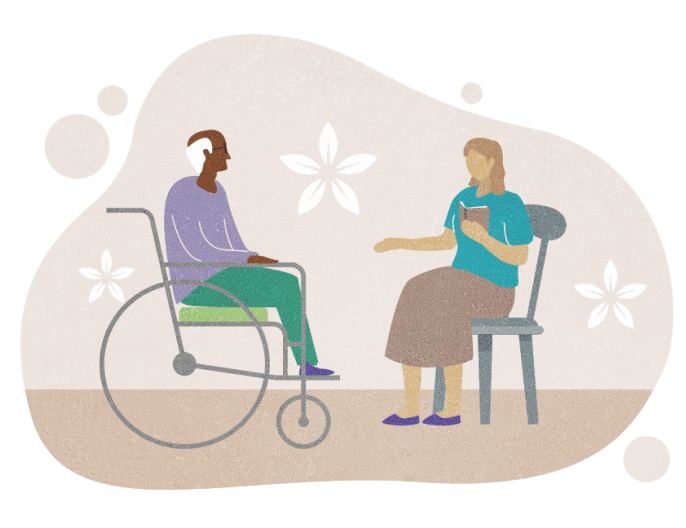Supporting dementia clients with communication
![]()

Supporting dementia sufferers with communication difficulties: tips and techniques
Dementia can be a challenging condition for both those with dementia and their carers. As the disease progresses, sufferers may experience communication difficulties such as trouble finding the right words, understanding others, or expressing themselves. These challenges can cause frustration, isolation, and other negative effects. However, there are ways to support those with dementia and enhance their communication skills. In this blog post, we will discuss some tips and techniques that can help those with dementia and their carers to communicate better and maintain their engagement and quality of life.
Use simple language and clear messages
Those with dementia may have trouble following complex or abstract language. Therefore, it’s important to use simple and direct language when communicating with them. Avoid using jargon, idioms, or sarcastic remarks that may confuse or upset them. Speak slowly and clearly and give them enough time to process the message. Repeat or rephrase the message if necessary, but don’t speak too loudly or treat them as if they are deaf. Processing language may take longer, so do offer longer intervals before repeating your message.
Use nonverbal communication
Nonverbal communication can be a powerful tool to connect with those with dementia and convey emotions and intentions effectively. Use eye contact, facial expressions, gestures, and touch to show empathy, warmth, and respect. For instance, a gentle touch on the hand or a smile can convey reassurance and support. However, avoid physical gestures that may be perceived as threatening or invasive, such as pointing, grabbing, or looming over them.
Provide visual and tactile cues
Visual and tactile cues can help stimulate the senses and trigger memories and emotions. Show them pictures, videos, or objects that relate to their interests or past experiences. Play music or sing songs that they enjoy or that have personal significance for them. Use scents that are familiar to them, such as lavender or cinnamon, to create a calming or stimulating effect. Also, use touch to reinforce a sense of connection and comfort. This could be achieved by rubbing their back or holding their hand.
Create a calm and safe environment
The environment can have a significant impact on the communication and well-being of those with dementia. Create a calm and safe environment that minimises distractions or stressors. Reduce noise, clutter, or bright lights that may overwhelm or confuse them. Use natural or soft lighting, comfortable furniture, and familiar objects that can create a sense of familiarity and security. Also, avoid sudden movements or surprises that may startle or frighten them.
Be patient and accepting
Finally, one of the most important tips for supporting those with dementia with communication difficulties is to be patient, accepting, and understanding. Dementia can be a frustrating and sometimes heart-breaking condition that affects everyone differently. Therefore, don’t take their behaviours or words personally, and avoid getting angry or upset. Instead, try to empathise with their feelings and needs, and show them unconditional love and support. Also, seek help and resources from experts, support groups, or organisations that can offer advice and guidance on how to manage the challenges of dementia.
Those with dementia with communication difficulties can face many challenges in their daily lives, but carers can play a crucial role in supporting them and enhancing their quality of life. By using simple language, nonverbal communication, visual and tactile cues, creating a calm and safe environment, and being patient and accepting, carers can help their loved ones with dementia to communicate better and maintain their sense of identity and dignity. If you are caring for someone with dementia, remember that you are not alone and there are many resources and support networks available to empower you and make your journey easier. If you’d like to speak with our team, call 0208 857 7717.
Speak to our team
We’re always happy to have a friendly, informal chat. Call 0208 857 7717 to discuss your live-in care requirements with a member of our team.
